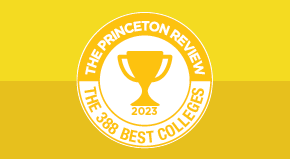To find the right college fit for you, think about what you need in four different categories: academics, campus culture, financial aid, and career services.
For 28 years, we've surveyed students at hundreds of colleges about their experiences on campus. We've learned a lot—first and foremost, that no two students are exactly alike, and no two schools are exactly alike. That's why we publish our ranking lists and school profiles every year: to help you compare colleges and find the best college fit for your unique personality and goals.
What college is right for me?
College fit comes down to your academic, social, and financial needs, as well as your career goals.

1. Academics
Does the college you're considering offer classes and learning opportunities that interest you? You don't need to declare a college major until your junior year of college—but you're more likely to succeed if you're excited about and engaged by the options available to you. Consider your learning style: do you prefer informative lectures or lively discussions? Research and analysis or hands-on experience and practice? Writing papers or working in small groups? Look for the academic experience you'll need to feel challenged and engaged, and what support you'll need for success—peer tutoring, accessible professors, mentorship, and career services are just some of the options you might find on campus. Check out course and program descriptions, reviews of professors, and sit in on some classes if you're able to visit campus.
Assessing your chances of admission can be a good way to identify a strong academic match (and, of course, your college list of dream and safety schools!). Most admissions counselors tell us that your GPA and the caliber of your high school classes are the most important elements of your college application, with standardized test scores not far behind. Check out the average numbers of the most recent incoming class and see how you measure up. You can find those stats in our school profiles, and if you want to improve your own numbers, we have a lot of tools to help.
2. Campus Culture
Do you want a big school or a small one? A hip urban campus or a verdant quad in the country? A college where everyone cheers on the basketball team, or one where every theater production gets a standing ovation? Every college has its own special vibe.
You can start narrowing down your list by making some decisions about the size of the student body and geographical location, and then move on to aspects you can identify by visiting campus, talking to current students and trusting your gut instincts: the personalities, politics, and interests of the student body. Take quality of life into account, too, and try to check out (or read about) the dorms, food, and recreational facilities on campus.
Read More: Use our College Search Tool
3. Financial Aid
The cost of college is one of the biggest concerns for student, parents, counselors. We hear that from the students we work with and see it on our College Hopes & Worries Survey. It's important to be realistic about your family's finances and avoid taking on unreasonable debts in the name of your education—but it's also important not to cross a school off your list because of a scary sticker price.
Many colleges and universities offer incredible financial aid packages (sometimes as a combination of grants and scholarships, which means no debt at all!). Raising your grades and your SAT or ACT scores will help you become more eligible for merit-based financial aid. And more and more data on college outcomes—that is, career placement rates and average starting salaries—is becoming available, which can help you assess the value of investing your tuition dollars in a particular college.
4. Career Development
In addition to making sure the schools you’re considering offer the majors and classes that interest you, visit or contact the career development center at each. Find out how the school supports students in preparing for the professional world. Do they offer resume writing workshops? Practice interviews? Networking events with alumni? If you foresee yourself in a particular field, location, or specific workplace, asl about past students’ track records of finding internships and entry-level jobs in those areas. College admission officers and career counselors are happy to highlight their institutions’ success stories—as well as any unique career launching programs and experiences that their campuses offer. If you’re not sure yet which direction you’ll go in, see if career coaching and personal evaluations are available for students. Many institutions extend career support to alumni, too, which can be invaluable in the early post-collegiate years. As more and more students factoring post-graduate plans into their college decision process, college admission and recruitment officers are emphasizing career support and placement when pitching their schools to prospective applicants.
Looking for strategic college advice?
Get one-on-one help from former Ivy League and top tier admission officers. Our College Counselors will help you find, apply, and get accepted to your dream school.
Explore Colleges For You
Connect with our featured colleges to find schools that both match your interests and are looking for students like you.
Get Started on Athletic Scholarships & Recruiting!
Join athletes who were discovered, recruited & often received scholarships after connecting with NCSA's 42,000 strong network of coaches.
Best 388 Colleges
154,000 students rate everything from their professors to their campus social scene.



